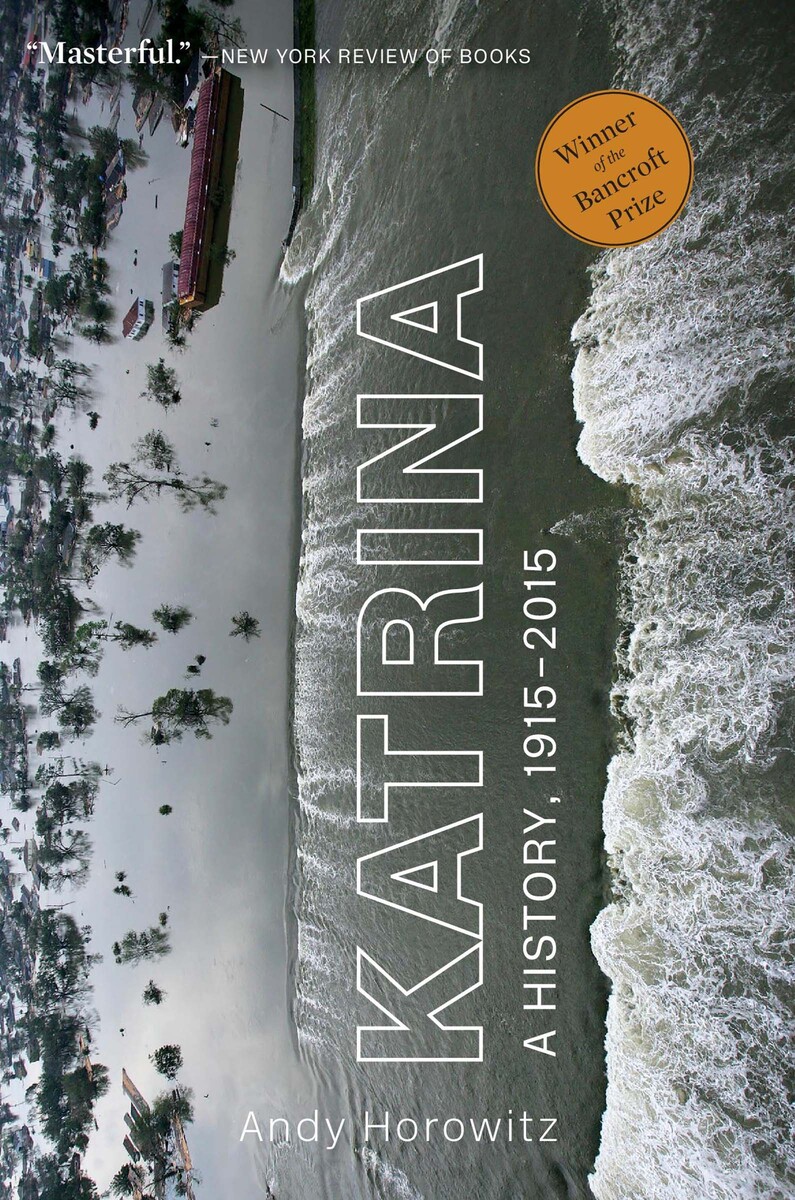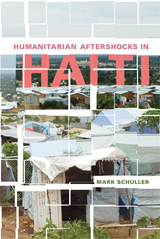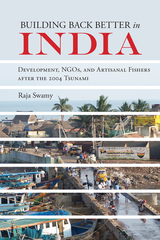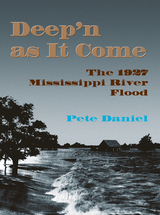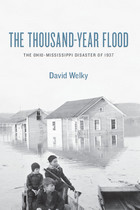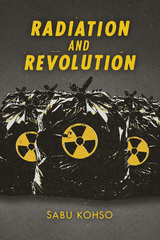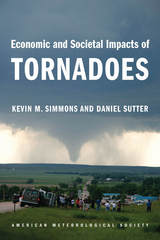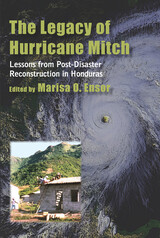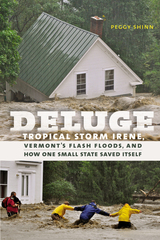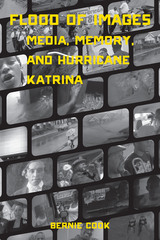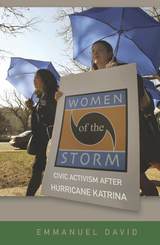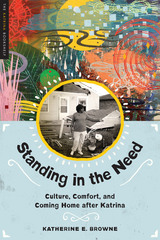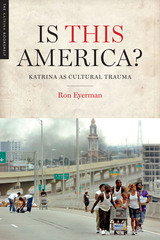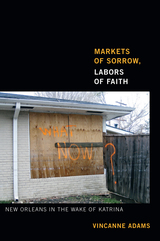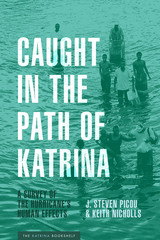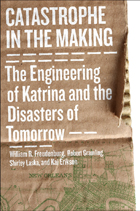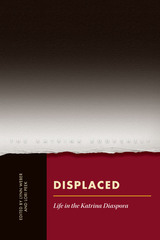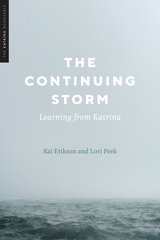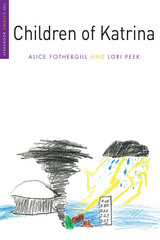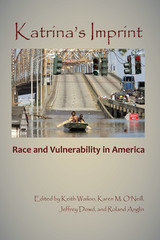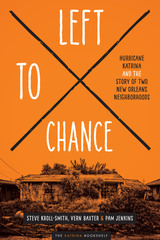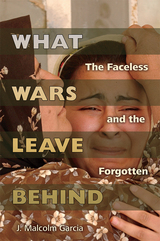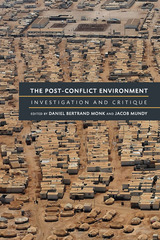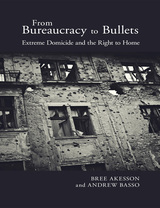The main thrust of Horowitz’s account is to make us understand Katrina—the civic calamity, not the storm itself—as a consequence of decades of bad decisions by humans, not an unanticipated caprice of nature…He leaves readers with a strong sense that it’s only a matter of time before there is a similar disaster in New Orleans, and that, in whatever lull there is between now and then, things aren’t great.
-- Nicholas Lemann New Yorker
Brilliant…If you want to read only one book to better understand why people in positions of power in government and industry do so little to address climate change, even with wildfires burning and ice caps melting and extinctions becoming a daily occurrence, this is the one… Horowitz shows—patiently and damningly—how the decisions made by Louisiana’s political and business elite systematically rendered the region vulnerable to disaster.
-- Scott W. Stern Los Angeles Review of Books
Easily the best book on the subject since Douglas Brinkley’s 2006 The Great Deluge: Hurricane Katrina, New Orleans, and the Mississippi Gulf Coast…The fact that Katrina’s impact fell disproportionately on poor Louisianans raises a host of issues that Horowitz addresses better than any previous narrative history of the catastrophe.
-- Steve Donoghue Christian Science Monitor
Horowitz does a masterful job of describing the public and private engineering projects that made possible real estate construction, oil exploration, and other forms of economic expansion in New Orleans during the twentieth century, building fortunes for a few while putting thousands in the path of the next big storm… Disasters have the power to reveal who we are, what we value, what we’re willing—and unwilling—to protect.
-- Eric Klinenberg New York Review of Books
Horowitz is engrossed by the stark imbalance that pandering to the powerful industries of shipping and oil and gas has produced between ‘private profits and public liabilities.’ His story is a feisty blend of urban environmental history and history of political economy, of land subsidence (drained land sinks) and subsidized loans that create a false sense of impermeability…From start to finish, Horowitz’s necessary book is passionately political.
-- Peter Coates Times Literary Supplement
This masterful history opens nearly a century before the storm and examines how so many people came to live in such a vulnerable place.
-- The Economist
Horowitz chronicles an endless hustle in which governments and wealthy developers seize landscapes and mold them without regard to long-term consequences, and in which white people and moneyed interests have fixed advantages…A sadly predictable, distinctly American story.
-- John McQuaid Washington Monthly
Politicians and corporations, among others, have made poor communities of color vulnerable to climate disasters. As Katrina: A History demonstrates, political and economic choices traded the present and future lives of Louisiana’s poor (and especially poor Black) people for unevenly distributed short-term gain…Attentive to history, Horowitz has harsh words for climate utopians who look for technological solutions to the city’s problems.
-- Elias Rodriques Bookforum
Calling upon a century of history to tell the story of what many Americans limit to a span of days or weeks, Horowitz’s Katrina is a devastating and important text for understanding the deep-seated inequality, infrastructure failure, and government carelessness that led to one of America’s worst disasters…Reading Horowitz in the age of COVID-19, as the powerful determine who and what are expendable, feels especially instructive.
-- Andru Okun Los Angeles Review of Books
The definitive portrait of the ‘causes and consequences’ of Hurricane Katrina. Horowitz brilliantly explores the disastrous links between warming temperatures, systemic racism, government mismanagement, and corporate greed. Few books better capture the monumental threat that climate change poses to America’s cities.
-- Publishers Weekly
For those who are interested in getting through this current disaster by reading about other disasters…The whole idea is that Katrina was not just a tragic singular event that happened in 2005, but the result of centuries of terrible—often intentional—political and business decisions that had been made over the course of the hundred years prior…A super lively and engaging writer.
-- The Strategist
[A] sweeping overview of the historic, social and economic factors that played into the disaster and its aftermath.
-- The Times-Picayune
A vivid and persuasive chronicle of the ‘causes and consequences’ of Hurricane Katrina…Horowitz argues that a combination of environmental challenges, structural racism, and governmental misjudgment resulted in a massive loss of life…Even readers who have never visited the Crescent City will be moved by this incisive account.
-- Publishers Weekly (starred review)
Incisive…Horowitz argues persuasively that the destruction incurred by Hurricane Katrina was not merely a meteorological event, but part of a long process of political, environmental, economic, and cultural decisions…An eye-opening environmental history.
-- Kirkus Reviews
Horowitz’s lucid, detailed, and balanced account of the long, crooked paths that led up to Katrina reinforces one of history’s most important lessons.
-- Daily Beast
Horowitz disrupts the narrative of disaster as exception…[Tells] the story of Katrina as a cycle of profit-driven and government-sanctioned growth and dispossession.
-- Maia Silber Public Books
Horowitz relentlessly pursues how the history of New Orleans, Louisiana, and the United States produced Katrina over the course of a century…Horowitz’s argument…has the potential to make a radical contribution to the history of technology…The writing is masterful, at times transcendent.
-- Cornelis Disco Technology and Culture
This thoroughly researched and clearly written book exposes the relationship between inequality and urban geography, offering a chilling glimpse of future disasters in the making.
-- Climate and Capitalism
Among the best histories of modern New Orleans. It is, moreover, a towering intervention in modern urban environmental and political history that shows not only how human actions shape disasters, but also how urban history is inseparable from metropolitan, regional, and national histories. Finally, it offers a warning that in an age of climate change and rising sea levels, no one may assume that future crises will visit themselves only on the disadvantaged in urban America.
-- J. Mark Souther The Metropole
Not only a definitive analysis of the storm as it affected New Orleans but also a peerless example of how historians should understand disasters—regardless of specialization—and why those events might matter even to scholars normally unconcerned with such seemingly extraordinary phenomena…As Horowitz goes on to illustrate in gripping detail, the wreckage of Hurricane Katrina is inextricable from decades of slow-moving, unexceptional events that are as much the province of social or political history as environmental history.
-- Adam Mandelman Environmental History
Horowitz is a gifted storyteller…This book is the best published history of Katrina. It is a major contribution to urban history, environmental history, and disaster studies, with relevance far beyond southern Louisiana.
-- Josiah Rector Journal of Southern History
Katrina: A History is a beautiful book about a long, ugly chapter in our nation’s history. Horowitz brilliantly demonstrates that the storm carried with it a century of poor decisions that both preceded and followed the disaster. Corporate greed, misguided policymaking, environmental blindness, corrupt politics, crippling racism, and class inequality: all these human failings were as significant as the broken levees and hurricane-force winds. This is not just a compelling history; it is a distressing warning about our future.
-- Lizabeth Cohen, author of Saving America’s Cities: Ed Logue and the Struggle to Renew Urban America in the Suburban Age
This is by far the most important treatment of Hurricane Katrina—an extraordinarily valuable work of scholarship. Andy Horowitz offers a fresh perspective that serves both as a corrective and also an entirely different way of understanding one of the most critical chapters in the nation’s environmental and political history.
-- Ari Kelman, author of A River and Its City: The Nature of Landscape in New Orleans
In 2005, in the eyes of many, the history of New Orleans and lower Louisiana shrank to a single moment of natural disaster. Andy Horowitz’s Katrina recovers the all-too-human policies, limited perspectives, and sheer greed that created the conditions for the events of 2005 over the course of the previous century—conditions that prevented an equitable recovery process, and continue to obscure the ways in which ‘Katrina’ was not just about one unfortunate group of people, but also heralds our collective future. This book is an important reinterpretation of the history of New Orleans, the history of disaster, and the history of our nation.
-- Leslie M. Harris, author of In the Shadow of Slavery: African Americans in New York City, 1626–1863
This book sees not only the forest and the trees but the blades of grass between the trees. Horowitz properly places the disaster of Hurricane Katrina in the much larger context of regional history, national and local policy decisions, and societal mores which all added up to having tragic if—mostly—unintended consequences, while not losing sight of intimate details and the personal stories of those who experienced the storm and rebuilt the city. Well-written and at times gripping, this is the most important book about Katrina so far.
-- John M. Barry, author of Rising Tide: The Great Mississippi Flood of 1927 and How It Changed America
Although it is difficult to imagine a fresh take, Andy Horowitz has provided one…Horowitz has made a superb contribution to the field. His long view of the conditions that created New Orleans’s particular vulnerability fundamentally shifts the paradigm for understanding both the impact of and recovery from the storm, and his extraordinary prose will make the reader stop and read twice just for the fun of it.
-- Christopher Manning Louisiana History
Meant to be read, and ought to be read, by anyone who wishes to be an engaged citizen in our current moment of climate change, racial reckoning, and vast economic inequality.
-- Aaron Sachs California History
Katrina is a masterful work that is multi-disciplinary in its approach to a very complex city situated in a hazardous environment…[and] a model for the evaluation of exposure and vulnerability in other cities and communities that experience geophysical events (such as earthquakes and tornadoes). It makes a strong case that ‘disasters’ are not natural.
-- Gerald Mills Society
